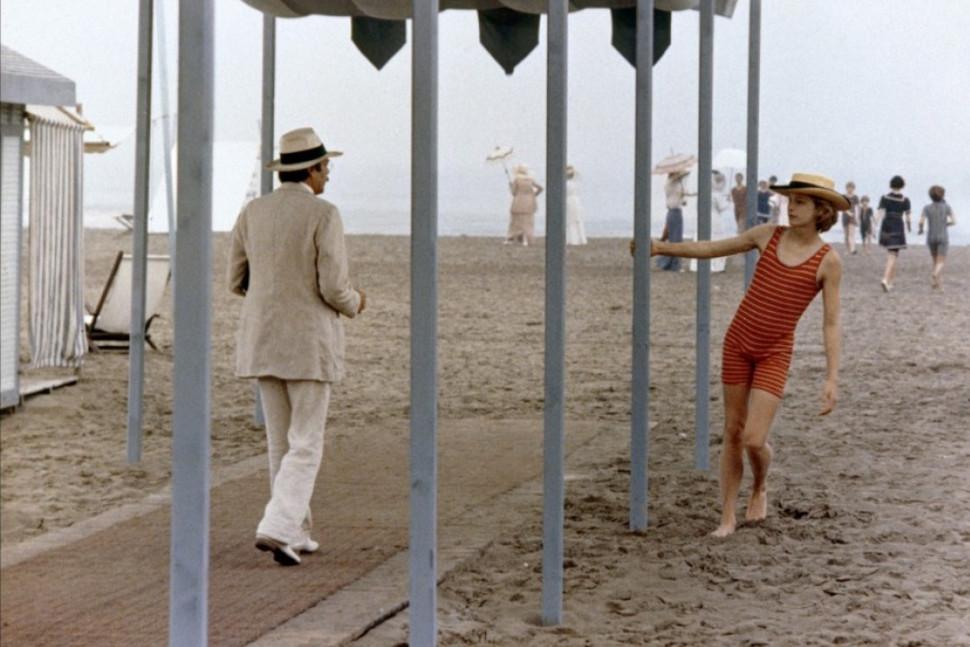| Director: | Luchino Visconti |
|---|---|
| Production: | Alfa Cinematografica, Warner Bros., Production Editions Cinématographiques Françaises |
| Running Time: | 130’ |
| Language: | English |
| Country: | Italy, France, USA |
| Year: | 1971 |
| Main Cast: | Dirk Bogarde, Romolo Valli, Marisa Berenson, Carole André, Björn Andrésen, Silvana Mangano, Franco Fabrizi, Leslie French |
| Screenplay: | Luchino Visconti, Nicola Badalucco |
| Cinematographer: | Pasquale De Santis |
| Editor: | Ruggero Mastroianni |
| Production Designer: | Ferdinando Scarfiotti |
| Costume Designer: | Piero Tosi |
| Restoration: | Cineteca di Bologna, Istituto Luce - Cinecittà |
Morte a Venezia (Death in Venice)

Synopsis
Based on Thomas Mann’s novella Death in Venice, Morte a Venezia follows the journey of the composer Gustav von Aschenbach, who leaves Germany for a vacation at the Lido in Venice.
“In the luxury hotel at which he is staying he meets Tadzio, a beautiful and enigmatic Polish boy, the oldest of four children, who troubles his senses and stirs his imagination. A living symbol of the classic measure that Aschenbach has pursued in his own work and not been able to achieve, Tadzio soon becomes an obsession. [...] In the meantime a cholera epidemic takes grip, and the city’s humid calli, disinfected to avoid contagion, are filled with a pungent and sinister odor, which in combination with the sirocco produces an enervating climate. In this stale atmosphere [...] Aschenbach’s spirit and body begin to waste away. [...] Moving in the suspense of a fantastic realism that hinges on the smoothness of the camera movements and the cutting of the sequences, Visconti [...] sets Aschenbach’s drama against the backdrop of the cosmopolitan society of the early 20th century that had its damp mooring in a dying Venice, and at the same time encapsulates the crisis of an entire culture.”
Giovanni Grazzini, “Il Corriere della Sera” (March 6, 1971).
Director’s Statement
I was born in 1906 and the world that surrounded me, the world of art, literature and music, was that world there. [...] I’m attached to it in the way that an apple born in an orchard has its roots in that soil and not on an Arabian beach. But on the other hand if you want to portray a certain society you have to do it in the context of the setting in which that society lived. Now everything is different. If I had to make a modern film today I don’t know where I’d go to find my settings [...]. European society up until the World War I was one of the greatest contrasts and the greatest aesthetic achievements. The contemporary world has instead been leveled out, it is so gray, so unaesthetic...
Interview with Daniela Pasti, “Il Mondo” (March 14, 1971)
Producers/Distributors
PRODUCTION 1: Fondazione Cineteca di Bologna
Via Riva di Reno 72
40122, Bologna - Italy
Tel. +39 (0)51 2194826
http://www.cinetecadibologna.it
PRODUCTION 2: Istituto Luce - Cinecittà
Via Tuscolana 1055
00173, Roma - Italy
Tel. +39 (0)6 722861
http://www.cinecitta.com
PRODUCTION 3: Warner Bros.
http://www.warnerbros.com
PRODUCTION 4: The Criterion Collection
http://www.criterion.com
PRODUCTION WHEN THE FILM WAS MADE: Alfa Cinematografica
COPRODUCTIONS WHEN THE FILM WAS MADE: Warner Bros., Production Editions Cinematographiques Francaises S.A.R.L.
WORLD SALES: Warner Bros.
For theatrical sales please contact the relevant office.
International: WBNonTheatrical@warnerbros.com
US & Canada: WBClassics@warnerbros.com
ITALIAN PRESS OFFICE: Andrea Ravagnan - Fondazione Cineteca di Bologna
Via Riva di Reno 72
40122, Bologna - Italy
Tel. +39 (0)51 2194833
cinetecaufficiostampa@cineteca.bologna.it
INTERNATIONAL PRESS OFFICE: Marlon Pellegrini
Istituto Luce - Cinecittà
Via Tuscolana 1055
00173, Roma - Italy
Tel. +39 (0)6 72286407
m.pellegrini@cinecittaluce.it


